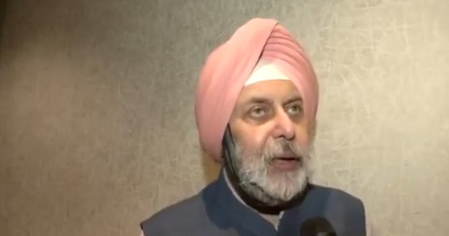Headlines
India's military response to Pahalgam attack brought back global attention on terrorism: Former Indian Ambassador Manjeev Puri

New Delhi, July 24
With nearly three months passing since the horrific Pahalgam terror attack on April 22, former Indian Ambassador Manjeev Singh Puri has said that India's miltary response named 'Operation Sindoor' was carried out to destroy only Pakistan-based terror launchpads and sites, which brought back the global attention of all countries standing unequivocally in one voice to condemn terrorism in all its forms.
This statement was made by former diplomat Puri at a conference held on Wednesday at the Constitution Club in the national capital, organised by The Centre for Global India Insights, a think-tank focused on global affairs, and India and the World magazine., which held deep analysis and thinking behind India's military response named 'Operation Sindoor', which was launched by Indian armed forces to avenge the killings of 26 innocent civilians in Jammu and Kashmir's Pahalgam by Pakistan-based terrorist group -- The Resistance Front (TRF).
This conference was attended by several former defence analysts, diplomats, political leaders, media persons and eminent personalities which discussed, analysed and deliberated upon the 'Operation Sindoor' as the powerful miltary response and set a new normal and doctrine set by the Narendra Modi government that terror attacks carried out by Pakistan on Indian soil will no longer will tolerated anymore.
Commenting on three months since the Pahalgam terror attack took place, former Indian Ambassador Puri said, "Pakistan is a major hub of terrorism, and people are aware of this. However, for various reasons, in recent times, global attention towards terrorism seems to have slightly shifted. We have made it clear to the world that this attention must not waver, the global gaze must remain fixed on terrorism... Just the way Osama Bin Laden was caught in Pakistan 10 years ago. Global terrorism, border terrorism and cross-border terrorism are important issues that world focuses on them. Pakistan depends on other nations for financial considerations and other things and it must realise that there is a cost to pay for terrorism emanating from their soil which ultimately affects the people of Pakistan. India and Pakistan got independent at the same time but India today is the fourth largest economy in the world and has a a high GDP per capita income while Pakistan must shun terrorism at the earliest and this realisation must toil over Pakistan sooner. They (Pakistan) must think about the interests of their own people and shun terrorism for their own good."
Speaking on the three months since Pahalgam attack took place, Lieutenant General (Retd) Syed Ata Hasnain said, "It (Operation Sindoor) was an 88-hour-long battle, spanning nearly four days, but the entire nation was involved in it. Modern warfare today is not fought by the military alone. Every organ of the country contributes to it whether economically, technically, militarily, and through the participation of the people and the public at large... This was a complex situation and even 1/3rd of the military operation like Operation Sindoor cannot be analysed in just three months, not even 20 per cent has been analysed till now. Holding events like panel discussions and seminars will help raise awareness among the public about India's military response like Operation Sindoor and project India abroad as a strong nation as well for its stern handling of terrorism."
Founder and CEO of Centre for Global India Insights, Manish Chand said, "...There are still lot of questions. It is a big issue in the Parliament since it concerns national security and development of the country. The objective of this conference on Operation Sindoor was to inform people about 'Operation Sindoor' -- its ideological and psychological dimensions. The Pahalgam terror attack was also an act of economic warfare, aimed at damaging the Indian economy, particularly the tourism-dependent economy of Jammu and Kashmir.... It was used as a geo-political ploy also to slow down the rise of India because India is emerging as a nation today while Pakistan could not. "
Bharatiya Janata Party Member of Parliament, Brij Lal, said, "...As part of global outreach efforts by the Narendra Modi government to expose Pakistan on terrorism, seven all-party delegations visited 33 countries. I was also a part of one such delegation that visited Japan, South Korea, Singapore, Malaysia, and Indonesia. There it was important that it was an all-party delegation representing different political parties. We told there that all political parties united against terrorism despite having politically and ideologically alike on several other issues but spoke in one voice on the matters related to national security. Earlier when terror attack was carried out in Uri and Pathankot, the Narendra Modi government conducted a surgical strike. Similarly in the aftermath of the Pulwama terror attack India carried out Balakot air strike and now Operation Sindoor was carried out to avenge the Pahalgam terror attack."
Commenting on three months since Pahalgam terror attack took place, Biju Janata Dal leader Amar Patnaik said, "... This (Operation Sindoor) will be discussed in detail in Parliament and then in the Standing Committee. India's response is strengthening the nation and is also sending a strong message to the global community. Not only is it sending a message to Pakistan, but also showing the world that India is powerful and will continue to act against terrorism in this manner."



































